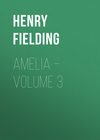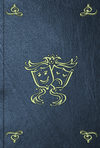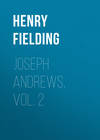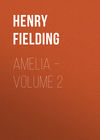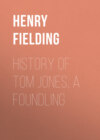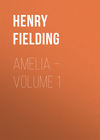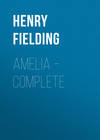Buch lesen: «Amelia – Volume 3», Seite 15
Chapter vi.
What passed between the doctor and the sick man
We left the doctor in the last chapter with the wounded man, to whom the doctor, in a very gentle voice, spoke as follows: —
"I am sorry, friend, to see you in this situation, and am very ready to give you any comfort or assistance within my power."
"I thank you kindly, doctor," said the man. "Indeed I should not have presumed to have sent to you had I not known your character; for, though I believe I am not at all known to you, I have lived many years in that town where you yourself had a house; my name is Robinson. I used to write for the attorneys in those parts, and I have been employed on your business in my time."
"I do not recollect you nor your name," said the doctor; "but consider, friend, your moments are precious, and your business, as I am informed, is to offer up your prayers to that great Being before whom you are shortly to appear. But first let me exhort you earnestly to a most serious repentance of all your sins."
"O doctor!" said the man; "pray; what is your opinion of a death-bed repentance?"
"If repentance is sincere," cries the doctor, "I hope, through the mercies and merits of our most powerful and benign Intercessor, it will never come too late."
"But do not you think, sir," cries the man, "that, in order to obtain forgiveness of any great sin we have committed, by an injury done to our neighbours, it is necessary, as far as in us lies, to make all the amends we can to the party injured, and to undo, if possible, the injury we have done?"
"Most undoubtedly," cries the doctor; "our pretence to repentance would otherwise be gross hypocrisy, and an impudent attempt to deceive and impose upon our Creator himself."
"Indeed, I am of the same opinion," cries the penitent; "and I think further, that this is thrown in my way, and hinted to me by that great Being; for an accident happened to me yesterday, by which, as things have fallen out since, I think I plainly discern the hand of Providence. I went yesterday, sir, you must know, to a pawnbroker's, to pawn the last moveable, which, except the poor cloathes you see on my back, I am worth in the world. While I was there a young lady came in to pawn her picture. She had disguised herself so much, and pulled her hood so over her face, that I did not know her while she stayed, which was scarce three minutes. As soon as she was gone the pawnbroker, taking the picture in his hand, cried out, Upon my word, this is the handsomest face I ever saw in my life! I desired him to let me look on the picture, which he readily did – and I no sooner cast my eyes upon it, than the strong resemblance struck me, and I knew it to be Mrs. Booth."
"Mrs. Booth! what Mrs. Booth?" cries the doctor.
"Captain Booth's lady, the captain who is now below," said the other.
"How?" cries the doctor with great impetuosity.
"Have patience," said the man, "and you shall hear all. I expressed some surprize to the pawnbroker, and asked the lady's name. He answered, that he knew not her name; but that she was some undone wretch, who had the day before left all her cloathes with him in pawn. My guilt immediately flew in my face, and told me I had been accessory to this lady's undoing. The sudden shock so affected me, that, had it not been for a dram which the pawnbroker gave me, I believe I should have sunk on the spot."
"Accessary to her undoing! how accessary?" said the doctor. "Pray tell me, for I am impatient to hear."
"I will tell you all as fast as I can," cries the sick man. "You know, good doctor, that Mrs. Harris of our town had two daughters, this Mrs. Booth and another. Now, sir, it seems the other daughter had, some way or other, disobliged her mother a little before the old lady died; therefore she made a will, and left all her fortune, except one thousand pound, to Mrs. Booth; to which will Mr. Murphy, myself, and another who is now dead, were the witnesses. Mrs. Harris afterwards died suddenly; upon which it was contrived by her other daughter and Mr. Murphy to make a new will, in which Mrs. Booth had a legacy of ten pound, and all the rest was given to the other. To this will, Murphy, myself, and the same third person, again set our hands."
"Good Heaven! how wonderful is thy providence!" cries the doctor —
"Murphy, say you?"
"He himself, sir," answered Robinson; "Murphy, who is the greatest rogue, I believe, now in the world."
"Pray, sir, proceed," cries the doctor.
"For this service, sir," said Robinson, "myself and the third person, one Carter, received two hundred pound each. What reward Murphy himself had I know not. Carter died soon afterwards; and from that time, at several payments, I have by threats extorted above a hundred pound more. And this, sir, is the whole truth, which I am ready to testify if it would please Heaven to prolong my life."
"I hope it will," cries the doctor; "but something must be done for fear of accidents. I will send to counsel immediately to know how to secure your testimony. – Whom can I get to send? – Stay, ay – he will do – but I know not where his house or his chambers are. I will go myself – but I may be wanted here."
While the doctor was in this violent agitation the surgeon made his appearance. The doctor stood still in a meditating posture, while the surgeon examined his patient. After which the doctor begged him to declare his opinion, and whether he thought the wounded man in any immediate danger of death. "I do not know," answered the surgeon, "what you call immediate. He may live several days – nay, he may recover. It is impossible to give any certain opinion in these cases." He then launched forth into a set of terms which the doctor, with all his scholarship, could not understand. To say the truth, many of them were not to be found in any dictionary or lexicon.
One discovery, however, the doctor made, and that was, that the surgeon was a very ignorant, conceited fellow, and knew nothing of his profession. He resolved, therefore, to get better advice for the sick; but this he postponed at present, and, applying himself to the surgeon, said, "He should be very much obliged to him if he knew where to find such a counsellor, and would fetch him thither. I should not ask such a favour of you, sir," says the doctor, "if it was not on business of the last importance, or if I could find any other messenger."
"I fetch, sir!" said the surgeon very angrily. "Do you take me for a footman or a porter? I don't know who you are; but I believe you are full as proper to go on such an errand as I am." (For as the doctor, who was just come off his journey, was very roughly dressed, the surgeon held him in no great respect.) The surgeon then called aloud from the top of the stairs, "Let my coachman draw up," and strutted off without any ceremony, telling his patient he would call again the next day.
At this very instant arrived Murphy with the other bail, and, finding Booth alone, he asked the bailiff at the door what was become of the doctor? "Why, the doctor," answered he, "is above-stairs, praying with – ." "How!" cries Murphy. "How came you not to carry him directly to Newgate, as you promised me?" "Why, because he was wounded," cries the bailiff. "I thought it was charity to take care of him; and, besides, why should one make more noise about the matter than is necessary?" "And Doctor Harrison with him?" said Murphy. "Yes, he is," said the bailiff; "he desired to speak with the doctor very much, and they have been praying together almost this hour." "All is up and undone!" cries Murphy. "Let me come by, I have thought of something which I must do immediately."
Now, as by means of the surgeon's leaving the door open the doctor heard Murphy's voice naming Robinson peevishly, he drew softly to the top of the stairs, where he heard the foregoing dialogue; and as soon as Murphy had uttered his last words, and was moving downwards, the doctor immediately sallied from his post, running as fast as he could, and crying, Stop the villain! stop the thief!
The attorney wanted no better hint to accelerate his pace; and, having the start of the doctor, got downstairs, and out into the street; but the doctor was so close at his heels, and being in foot the nimbler of the two, he soon overtook him, and laid hold of him, as he would have done on either Broughton or Slack in the same cause.
This action in the street, accompanied with the frequent cry of Stop thief by the doctor during the chase, presently drew together a large mob, who began, as is usual, to enter immediately upon business, and to make strict enquiry into the matter, in order to proceed to do justice in their summary way.
Murphy, who knew well the temper of the mob, cried out, "If you are a bailiff, shew me your writ. Gentlemen, he pretends to arrest me here without a writ."
Upon this, one of the sturdiest and forwardest of the mob, and who by a superior strength of body and of lungs presided in this assembly, declared he would suffer no such thing. "D – n me," says he, "away to the pump with the catchpole directly – shew me your writ, or let the gentleman go – you shall not arrest a man contrary to law."
He then laid his hands on the doctor, who, still fast griping the attorney, cried out, "He is a villain – I am no bailiff, but a clergyman, and this lawyer is guilty of forgery, and hath ruined a poor family."
"How!" cries the spokesman – "a lawyer! – that alters the case."
"Yes, faith," cries another of the mob, "it is lawyer Murphy. I know him very well."
"And hath he ruined a poor family? – like enough, faith, if he's a lawyer. Away with him to the justice immediately."
The bailiff now came up, desiring to know what was the matter; to whom Doctor Harrison answered that he had arrested that villain for a forgery. "How can you arrest him?" cries the bailiff; "you are no officer, nor have any warrant. Mr. Murphy is a gentleman, and he shall be used as such."
"Nay, to be sure," cries the spokesman, "there ought to be a warrant; that's the truth on't."
"There needs no warrant," cries the doctor. "I accuse him of felony; and I know so much of the law of England, that any man may arrest a felon without any warrant whatever. This villain hath undone a poor family; and I will die on the spot before I part with him."
"If the law be so," cries the orator, "that is another matter. And to be sure, to ruin a poor man is the greatest of sins. And being a lawyer too makes it so much the worse. He shall go before the justice, d – n me if he shan't go before the justice! I says the word, he shall."
"I say he is a gentleman, and shall be used according to law," cries the bailiff; "and, though you are a clergyman," said he to Harrison, "you don't shew yourself as one by your actions."
"That's a bailiff," cries one of the mob: "one lawyer will always stand by another; but I think the clergyman is a very good man, and acts becoming a clergyman, to stand by the poor."
At which words the mob all gave a great shout, and several cried out,
"Bring him along, away with him to the justice!"
And now a constable appeared, and with an authoritative voice declared what he was, produced his staff, and demanded the peace.
The doctor then delivered his prisoner over to the officer, and charged him with felony; the constable received him, the attorney submitted, the bailiff was hushed, and the waves of the mob immediately subsided.
The doctor now balanced with himself how he should proceed: at last he determined to leave Booth a little longer in captivity, and not to quit sight of Murphy before he had lodged him safe with a magistrate. They then all moved forwards to the justice; the constable and his prisoner marching first, the doctor and the bailiff following next, and about five thousand mob (for no less number were assembled in a very few minutes) following in the procession.
They found the magistrate just sitting down to his dinner; however, when he was acquainted with the doctor's profession, he immediately admitted him, and heard his business; which he no sooner perfectly understood, with all its circumstances, than he resolved, though it was then very late, and he had been fatigued all the morning with public business, to postpone all refreshment till he had discharged his duty. He accordingly adjourned the prisoner and his cause to the bailiff's house, whither he himself, with the doctor, immediately repaired, and whither the attorney was followed by a much larger number of attendants than he had been honoured with before.
Chapter vii.
In which the history draws towards a conclusion
Nothing could exceed the astonishment of Booth at the behaviour of the doctor at the time when he sallied forth in pursuit of the attorney; for which it was so impossible for him to account in any manner whatever. He remained a long time in the utmost torture of mind, till at last the bailif's wife came to him, and asked him if the doctor was not a madman? and, in truth, he could hardly defend him from that imputation.
While he was in this perplexity the maid of the house brought him a message from Robinson, desiring the favour of seeing him above-stairs. With this he immediately complied.
When these two were alone together, and the key turned on them (for the bailiff's wife was a most careful person, and never omitted that ceremony in the absence of her husband, having always at her tongue's end that excellent proverb of "Safe bind, safe find"), Robinson, looking stedfastly upon Booth, said, "I believe, sir, you scarce remember me."
Booth answered that he thought he had seen his face somewhere before, but could not then recollect when or where.
"Indeed, sir," answered the man, "it was a place which no man can remember with pleasure. But do you not remember, a few weeks ago, that you had the misfortune to be in a certain prison in this town, where you lost a trifling sum at cards to a fellow-prisoner?"
This hint sufficiently awakened Booth's memory, and he now recollected the features of his old friend Robinson. He answered him a little surlily, "I know you now very well, but I did not imagine you would ever have reminded me of that transaction."
"Alas, sir!" answered Robinson, "whatever happened then was very trifling compared to the injuries I have done you; but if my life be spared long enough I will now undo it all: and, as I have been one of your worst enemies, I will now be one of your best friends."
He was just entering upon his story when a noise was heard below which might be almost compared to what have been heard in Holland when the dykes have given way, and the ocean in an inundation breaks in upon the land. It seemed, indeed, as if the whole world was bursting into the house at once.
Booth was a man of great firmness of mind, and he had need of it all at this instant. As for poor Robinson, the usual concomitants of guilt attended him, and he began to tremble in a violent manner.
The first person who ascended the stairs was the doctor, who no sooner saw Booth than he ran to him and embraced him, crying, "My child, I wish you joy with all my heart. Your sufferings are all at an end, and Providence hath done you the justice at last which it will, one day or other, render to all men. You will hear all presently; but I can now only tell you that your sister is discovered and the estate is your own."
Booth was in such confusion that he scarce made any answer, and now appeared the justice and his clerk, and immediately afterwards the constable with his prisoner, the bailiff, and as many more as could possibly crowd up-stairs.
The doctor now addressed himself to the sick man, and desired him to repeat the same information before the justice which he had made already; to which Robinson readily consented.
While the clerk was taking down the information, the attorney expressed a very impatient desire to send instantly for his clerk, and expressed so much uneasiness at the confusion in which he had left his papers at home, that a thought suggested itself to the doctor that, if his house was searched, some lights and evidence relating to this affair would certainly be found; he therefore desired the justice to grant a search-warrant immediately to search his house.
The justice answered that he had no such power; that, if there was any suspicion of stolen goods, he could grant a warrant to search for them.
"How, sir!" said the doctor, "can you grant a warrant to search a man's house for a silver tea-spoon, and not in a case like this, where a man is robbed of his whole estate?"
"Hold, sir," says the sick man; "I believe I can answer that point; for I can swear he hath several title-deeds of the estate now in his possession, which I am sure were stolen from the right owner."
The justice still hesitated. He said title-deeds savoured of the Realty, and it was not felony to steal them. If, indeed, they were taken away in a box, then it would be felony to steal the box.
"Savour of the Realty! Savour of the f – talty," said the doctor. "I never heard such incomprehensible nonsense. This is impudent, as well as childish trifling with the lives and properties of men."
"Well, sir," said Robinson, "I now am sure I can do his business; for I know he hath a silver cup in his possession which is the property of this gentleman (meaning Booth), and how he got it but by stealth let him account if he can."
"That will do," cries the justice with great pleasure. "That will do; and if you will charge him on oath with that, I will instantly grant my warrant to search his house for it." "And I will go and see it executed," cries the doctor; for it was a maxim of his, that no man could descend below himself in doing any act which may contribute to protect an innocent person, or to bring a rogue to the gallows.
The oath was instantly taken, the warrant signed, and the doctor attended the constable in the execution of it.
The clerk then proceeded in taking the information of Robinson, and had just finished it, when the doctor returned with the utmost joy in his countenance, and declared that he had sufficient evidence of the fact in his possession. He had, indeed, two or three letters from Miss Harris in answer to the attorney's frequent demands of money for secrecy, that fully explained the whole villany.
The justice now asked the prisoner what he had to say for himself, or whether he chose to say anything in his own defence.
"Sir," said the attorney, with great confidence, "I am not to defend myself here. It will be of no service to me; for I know you neither can nor will discharge me. But I am extremely innocent of all this matter, as I doubt not but to make appear to the satisfaction of a court of justice."
The legal previous ceremonies were then gone through of binding over the prosecutor, &c., and then the attorney was committed to Newgate, whither he was escorted amidst the acclamations of the populace.
When Murphy was departed, and a little calm restored in the house, the justice made his compliments of congratulation to Booth, who, as well as he could in his present tumult of joy, returned his thanks to both the magistrate and the doctor. They were now all preparing to depart, when Mr. Bondum stept up to Booth, and said, "Hold, sir, you have forgot one thing – you have not given bail yet."
This occasioned some distress at this time, for the attorney's friend was departed; but when the justice heard this, he immediately offered himself as the other bondsman, and thus ended the affair.
It was now past six o'clock, and none of the gentlemen had yet dined. They very readily, therefore, accepted the magistrate's invitation, and went all together to his house.
And now the very first thing that was done, even before they sat down to dinner, was to dispatch a messenger to one of the best surgeons in town to take care of Robinson, and another messenger to Booth's lodgings to prevent Amelia's concern at their staying so long.
The latter, however, was to little purpose; for Amelia's patience had been worn out before, and she had taken a hackney-coach and driven to the bailiff's, where she arrived a little after the departure of her husband, and was thence directed to the justice's.
Though there was no kind of reason for Amelia's fright at hearing that her husband and Doctor Harrison were gone before the justice, and though she indeed imagined that they were there in the light of complainants, not of offenders, yet so tender were her fears for her husband, and so much had her gentle spirits been lately agitated, that she had a thousand apprehensions of she knew not what. When she arrived, therefore, at the house, she ran directly into the room where all the company were at dinner, scarce knowing what she did or whither she was going.
She found her husband in such a situation, and discovered such chearfulness in his countenance, that so violent a turn was given to her spirits that she was just able, with the assistance of a glass of water, to support herself. She soon, however, recovered her calmness, and in a little time began to eat what might indeed be almost called her breakfast.
The justice now wished her joy of what had happened that day, for which she kindly thanked him, apprehending he meant the liberty of her husband. His worship might perhaps have explained himself more largely had not the doctor given him a timely wink; for this wise and good man was fearful of making such a discovery all at once to Amelia, lest it should overpower her, and luckily the justice's wife was not well enough acquainted with the matter to say anything more on it than barely to assure the lady that she joined in her husband's congratulation.
Amelia was then in a clean white gown, which she had that day redeemed, and was, indeed, dressed all over with great neatness and exactness; with the glow therefore which arose in her features from finding her husband released from his captivity, she made so charming a figure, that she attracted the eyes of the magistrate and of his wife, and they both agreed when they were alone that they had never seen so charming a creature; nay, Booth himself afterwards told her that he scarce ever remembered her to look so extremely beautiful as she did that evening.
Whether Amelia's beauty, or the reflexion on the remarkable act of justice he had performed, or whatever motive filled the magistrate with extraordinary good humour, and opened his heart and cellars, I will not determine; but he gave them so hearty a welcome, and they were all so pleased with each other, that Amelia, for that one night, trusted the care of her children to the woman where they lodged, nor did the company rise from table till the clock struck eleven.
They then separated. Amelia and Booth, having been set down at their lodgings, retired into each other's arms; nor did Booth that evening, by the doctor's advice, mention one word of the grand affair to his wife.
